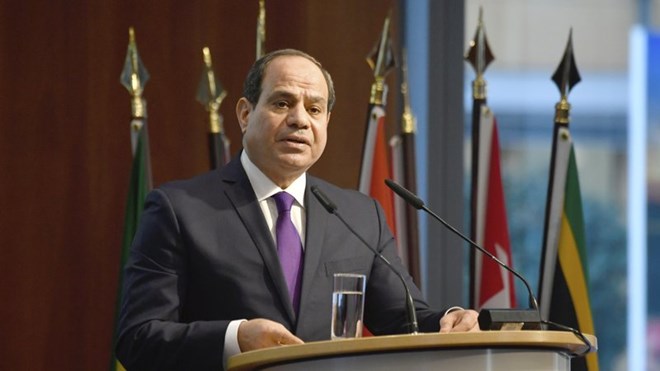
Sunday June 7, 2020
On this Nov. 19, 2019, file photo, Egypt's President Abdel Fattah al-Sisi speaks at the "G20 Investment Summit - German Business and the CwA Countries 2019" on the sidelines of a Compact with Africa (CwA) in Berlin, Germany. Egypt’s president has announced an initiative to end the civil war in neighboring Libya. The move has been accepted by the commander of the eastern Libyan forces, which have suffered heavy defeats in recent weeks. Egyptian President Abdel-Fattah el-Sissi declared his initiative in a ceremony in Cairo Saturday, June 6, 2020. (John MacDougall/Pool via AP, File)
CAIRO (AP) — Egypt’s president Saturday announced a unilateral initiative to end the civil war in neighboring Libya, a plan that was accepted by Khalifa Hifter, commander of the eastern forces that have suffered heavy losses in recent weeks.
President Abdel Fattah el-Sissi told a news conference in Cairo that his initiative includes a cease-fire starting Monday and is meant to pave the way for elections in oil-rich Libya. He warned against continuing to look for a military solution to the country’s crisis.
“There can be no stability in Libya unless peaceful means to the crisis are found that include the unity and integrity of the national institutions,” el-Sissi said. “The initiative could be a new start in Libya.”
Mohamed Gnono said Tripoli-allied forces Saturday took control of the town of al-Washka east of the important port city of Misrata. “We did not start this war, but it is we who will determine when and where it will end,” he said.
The conference in Cairo was attended by Hifter and Aguila Saleh, speaker of the Tobruk-based House of Representatives. Several foreign diplomats, including U.S., Russian, French and Italian envoys attended. Hifter and Saleh are allies.
There were no representatives of the Tripoli-based administration, or of its main backers, Turkey and Qatar, at the conference.
Egypt’s initiative comes on the heels of Hifter’s major losses in western Libya and failure to carry on with a major offensive to seize control of Tripoli that Hifter launched in April last year.
The future of the conflict in Libya appears to be open to one of two scenarios: de-escalation or a full-blown proxy war with major regional and international powers involved in outright conflict.
It was yet to be seen whether the Tripoli-based Government of National Accord will continue to press eastward to seize control of the vital oil installations, terminals and fields that tribes allied with Hifter shut down earlier this year. The shut-down paralyzed the country’s major source of income.
El-Sissi’s plan also comes amid the backdrop of U.S. warnings against Russia’s “fanning the flames” of the conflict, saying that it could deploy its own forces in Tunisia to deter the Russians from destabilizing North Africa.
It also remained to be seen what will happen if the GNA turns down Egypt’s olive branch. Heavier involvement by Turkey in Libya could propel Egypt to act defensively by getting more involved militarily in Libya.
El-Sissi, who has backed Hifter in the war, said the initiative included the formation of a presidential council in which Libya’s three regions would be represented. That council would rule the country during a 1 1/2-year transition period followed by elections.
The plan also includes the unification of all Libyan financial and oil institutions, and the disbanding of militias, so that the so-called Libyan National Army and other security agencies can “carry out their responsibilities,” el-Sissi said, without elaborating.
The Egyptian leader called for the withdrawal of all foreign fighters in Libya. Thousands of mercenaries, mostly form the war-torn Syria, have been fighting on both sides of the war.
Hifter said Saturday that Turkish intervention would increase regional and international polarization over Libya and “prolong the conflict.” He urged his host, el-Sissi, to work to force Turkey to withdraw its forces and the mercenaries it has sent.
“Turkey is sponsoring terrorism in front of the world and is transferring terrorists from one place to another within the Middle East and North Africa,” Hifter said. “This will further complicate the solution of the Libyan crisis.”
The United Arab Emirates, another main backer of Hifter, welcomed the initiative, saying the political solution was “the only acceptable option to reach the desired stability and prosperity” in Libya, according to state-run WAM news agency.
The U.S., Saudi Arabia and Jordan also welcomed the Egyptian plan. “We call on all sides to participate in good faith to halt the fighting and return to the UN-led political negotiations,” the U.S. Embassy in Libya tweeted.
Claudia Gazzini, a senior analyst with the Brussels-based International Crisis Group, said the Egypt initiative will be hard to sell.
“Overall, a show of goodwill but difficult to see it — in its current form — gain much support in the GNA ranks, or in Ankara,” she said.
Gazzini said the initiative left “all the controversial issues that have impeded settlement in the past unresolved: No accountability. Only Hifter’s LAAF is referred to as Libya’s security provider.”
The chaos in the oil-rich country has worsened in recent months as foreign backers increasingly intervene, despite pledges to the contrary at a high-profile peace summit in Berlin earlier this year. Hifter’s offensive on Tripoli has deeply polarized the already divided country and aborted U.N. efforts to hold a peace conference more than a year ago.
The military tide has been reversed in recent weeks. His forces lost almost all the territory they had gained since the beginning of the Tripoli offensive after Turkey increased its support to an array of militias loosely allied with the Tripoli-based government.
Libya has been in turmoil since 2011 when a civil war toppled long-time dictator Moammar Gadhafi, who was later killed.